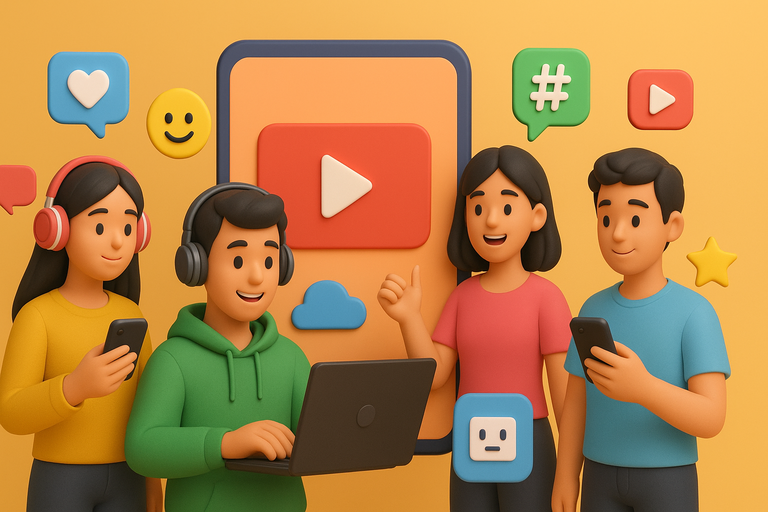The Emotional Economy of Media
Entertainment in Indonesia is no longer about passive consumption. For Millennials and Gen Z, media has become a space for identity, community, and activism. According to the Indonesia Millennial and Gen Z Report 2026, content is not just consumed—it is co-created, remixed, and shared as part of daily life.
This generational shift explains why Indonesian Millennials and Gen Z media behaviors are so distinct. Millennials, who grew up transitioning from analog to digital, often use media for comfort, nostalgia, and emotional reflection. Slice-of-life films, heartfelt music, and family dramas resonate strongly. Gen Z, in contrast, sees media as a megaphone for self-expression. From TikTok dances to meme culture, they use content to declare identity and connect with global communities.
Together, these behaviors are transforming entertainment into what experts call the “emotional economy”—a system where the value of content lies not in scale but in resonance.
Why Fandom Feels Like Family
One of the strongest expressions of Indonesian Millennials and Gen Z media culture is fandom. Whether it’s K-pop groups, anime series, or local film stars, fandoms provide a sense of belonging that goes beyond entertainment. Fans organize campaigns, raise funds, and even advocate for social causes through their communities.
For Millennials, fandom often offers an emotional anchor amid the stresses of work and family responsibilities. For Gen Z, it is a tool for activism and identity-building. Digital fandoms operate like chosen families, offering validation and solidarity that may not be available in offline spaces.
This explains why hashtags, fan edits, and digital campaigns are now integral parts of Indonesia’s cultural landscape. Entertainment is not just watched—it is lived, shared, and mobilized.
Meme Culture and Digital Identity
Meme culture illustrates how humor has become political, social, and deeply personal. In Indonesia, memes are more than jokes; they are tools for critique and emotional release. Millennials use them to reflect on daily struggles, from housing costs to parenting stress, while Gen Z employs memes to spotlight political issues, mental health, or identity debates.
The report highlights how Indonesian Millennials and Gen Z media behaviors make meme culture a key site of negotiation. Humor becomes a shield against burnout and a weapon for social commentary. Memes are lightweight but carry heavy meaning—they condense frustration, hope, and solidarity into bite-sized, shareable formats.
Binge and Belong: Streaming as a Social Ritual
Streaming platforms have fundamentally reshaped leisure habits. Millennials binge-watch series as a way to unwind, while Gen Z turns it into a social ritual. Shows are watched not just for entertainment but for community participation—whether joining fan threads on Twitter, creating TikTok reviews, or debating storylines in Discord groups.
The report identifies this as a “scroll-driven story culture.” Entertainment is no longer linear or private; it is fragmented, participatory, and shared across platforms. Indonesian Millennials and Gen Z media habits illustrate how streaming is tied to belonging. Watching together, even virtually, creates a sense of connection that feels just as real as offline gatherings.
Global Platforms, Local Soul
Indonesia is one of the largest digital consumer markets in Southeast Asia. Global platforms like Netflix, TikTok, and Spotify dominate usage, but the demand for local narratives is rising. The report notes how younger audiences want stories that reflect their identities, cultures, and struggles.
This creates a paradox: while global platforms provide reach, they must adapt to local sensibilities. Indonesian films, music, and podcasts are gaining traction, not only at home but also abroad. The rise of “Indonesia-core” content shows how local culture can resonate globally when told authentically.
This shift highlights how Indonesian Millennials and Gen Z media are simultaneously globalized and localized. They embrace international trends but demand narratives that reflect their emotional truth.
Podcasts and the Emotional Economy
Podcasts have emerged as one of the fastest-growing content forms in Indonesia. For Millennials, podcasts provide companionship during commutes or work routines. For Gen Z, they are intimate spaces to discuss mental health, identity, or activism.
The appeal lies in their authenticity. Unlike polished broadcasts, podcasts feel personal, conversational, and emotionally attuned. This aligns with the emotional economy driving modern entertainment. Content that makes people feel seen and heard resonates far more than mass-market spectacles.
Rethinking Leisure Through Regeneration
Entertainment is no longer just about escape. Millennials and Gen Z are redefining leisure as an act of regeneration. Wellness retreats, mindfulness apps, and creative hobbies are integrated into daily life. Even digital entertainment is being used to restore rather than drain energy.
This shift underscores how Indonesian Millennials and Gen Z media is not about endless consumption but about meaningful engagement. They are choosing content that aligns with their emotional needs, values, and aspirations.
The Future of Media: Personal, Participatory, and Proudly Local
The report concludes that the future of Indonesian entertainment will be shaped by personalization, participation, and localization. Content that empowers audiences to co-create, reflects cultural nuances, and resonates emotionally will thrive.
For businesses and creators, this is both a challenge and an opportunity. The new media economy rewards authenticity, emotional intelligence, and inclusivity. For policymakers, supporting local creators and safeguarding digital wellbeing are essential to ensure that entertainment remains a tool for empowerment.
Ultimately, Indonesian Millennials and Gen Z media habits reflect a broader truth: entertainment is no longer just about passing time. It is about building identity, community, and culture in an age where every scroll, meme, and stream carries meaning.
Sources:
- IDN Research Institute. Indonesia Millennial and Gen Z Report 2026.
- We Are Social & Hootsuite (2025). Digital Media Usage in Indonesia.
- Nielsen Indonesia Media Trends Report 2025.







 Monday, 02-03-26
Monday, 02-03-26







